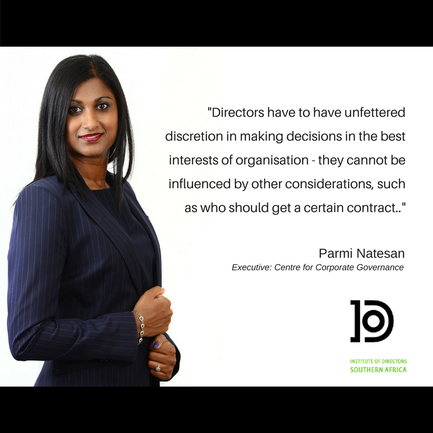 Recent events in both the public and private sectors are again highlighting the key role that proper succession planning plays in supporting any organisation’s sustainability, particularly when it comes to CEOs and governing-body chairs. Poor succession planning inevitably creates a leadership vacuum at both governing body and executive management level resulting in a loss of the longer term strategic focus. The impacts of this uncertainty can be dire, says Richard Foster, facilitator at the Institute of Directors in Southern Africa (IoDSA). Impacts can include a loss of performance delivery influenced by such factors as possible churn at the senior management level, the loss of market share to more focused competitors, severe reputational damage and erosion of investor and other key stakeholder confidence in both the governing body and senior management alike. “Because good governance relies on effective leadership, succession planning receives significant focus in King IV. In addition, its five sector supplements deal with the specific issues relating to succession planning in different contexts,” Mr Foster notes. The position is particularly complex when it comes to state-owned entities (SOEs) because certain appointments like the CEO and governing-body chair are typically mandated in legislation or founding documents. The shareholder thus plays a key role, and the process is not as easily aligned with what is considered governance best practice, he says. A similar situation exists in local government. One mark of the difficulties of proper succession planning at SOEs is the reliance on interim appointments. However, they inevitably create uncertainty unless they are well thought-through and the process is properly communicated to stakeholders. “One of the governing body’s primary functions is to create and oversee the implementation of strategy, implying a three-to-five-year, or even longer timeline. Interim appointments, by contrast, tend to be operationally focused pending a permanent appointment,” he says. King IV recommends that governing bodies should ensure succession plans exist for their own members, as well as for the CEO and executive management team. However, because succession planning is intimately connected with the appointment of these senior office-bearers, succession planning for SOEs is, as previously mentioned, more complex and challenging. Typically, the shareholder/executive authority (ultimately the government) has the power (or obligation) to appoint the chair and/or the CEO and/or other governing-body members. In its SOE Sector Supplement, King IV recommends that these appointments should be accomplished via a robust and transparent process that involves the governing body (the accounting authority) as much as possible to give effect to the aspirations of the relevant principle. “The processes for appointing CEOs or chairs at certain SOEs is sometimes questioned. The damage caused by unsuitable appointments is now plain, and both the organisations and the economy as a whole are affected,” he says. To align succession planning in SOEs better with governance best practice, the King IV SOE Sector Supplement recommends that the CEO’s letter of appointment should clearly state that the CEO is accountable to the governing body (rather than the executive authority i.e. shareholder), that the governing body and CEO jointly agree on how the CEO’s performance should be measured, and that the governing body has the primary responsibility for firing the CEO. “It is encouraging that Government seems to have now recognised that good corporate governance requires ethical and effective leadership, and that increased focus appears to have been placed on the succession planning and attendant appointment process,” Mr Foster concludes. “The consequences of not following the recommended practices of good governance are now plain to see.” ENDS MEDIA CONTACT: Idéle Prinsloo, 082 573 9219, [email protected], www.atthatpoint.co.za For more information on the IoDSA please visit: Website: www.iodsa.co.za Twitter: @The_IoDSA LinkedIn: Institute of Directors in Southern Africa Company Page
0 Comments
In his much-lauded State of the Nation Address (SONA), President Cyril Ramaphosa devoted considerable attention to the challenge of rooting out corruption in government. “This is the year in which we will turn the tide on corruption in our public institutions,” he declared.
In this regard, President Ramaphosa made two key announcements in SONA. Base SOE board appointments on competence The first is that board appointments in the public sector will be based on “expertise, experience and integrity”—and not, by implication, on political connections or amenability to corruption. “This is very good news; the IoDSA has consistently pinpointed the appointment of unskilled people to boards and a lack of due diligence on those appointments, as key weaknesses in our state institutions,” says Parmi Natesan, Executive: Centre for Corporate Governance at the Institute of Directors Southern Africa (IoDSA). “In July last year government gave an undertaking to finalise a framework for board appointments as part of National Treasury’s Inclusive Growth Action Plan. The IoDSA made several recommendations at that stage, and we hope the President’s promise means the framework will be finalised and implemented. We are here and ready to help.” Natesan points out that the ongoing tribulations at most state-owned institutions, as well as within the private sector, strengthen the IoDSA’s argument that building a cohort of professional directors is imperative in order to strengthen our economy’s ability to grow. To that end, the IoDSA has formal Chartered Director (SA) and Certified Director designations that provide a framework for directors to acquire and demonstrate the specialist skills, experience and integrity needed to discharge their duties with mastery. Remove SOE board members from procurement roles Second, the President specifically promised to remove board members from any role in procurement, something that has become commonplace in some state-owned enterprises. Comments Ms Natesan, “To ensure a well-governed, ethical organisation, it is essential that there is role clarity: directors must focus on governance and not get involved in operational matters like procurement. Doing so compromises their independence. Directors have to have unfettered discretion in making decisions in the best interests of organisation—they cannot be influenced by other considerations, such as who should get a certain contract.” Natesan says that boards must develop ways of discharging their oversight role that do not cross the line into operational involvement, especially in areas like procurement, which is a high-risk area for public entities. These might include obtaining assurance from internal and external audit, ensuring that the organisation complies with relevant legislation such as the Public Finance Management Act, and instilling an ethical culture in the organisation through value-based leadership and a code of conduct—backed up by zero tolerance for unethical behaviour. Other tools would include proper oversight by the social and ethics and audit committees, and ensuring that the organisation has robust procurement (and other) policies and procedures. Lead by example Given the ultimate responsibility of governing bodies for the governance of ethics, it is critical that they themselves act ethically. “The essential first step to achieving this laudable goal is to instill leadership that is both effective and ethical (as espoused in the first principle of King IV) across all sectors. If this does not happen, it is pointless to implement governance in a tick-box approach. “The link between ethical and effective leadership is one of the distinguishing features of King IV, and I think recent events have shown us the fundamental truth of this.” The IoDSA has consistently argued that ethical institutions in both the public and private sectors alike are created from the top down, and that an organisation’s directors bear the main responsibility for ensuring that ethics are embedded in its DNA. ENDS MEDIA CONTACT: Juanita Vorster, 079 523 8374, [email protected], www.atthatpoint.co.za For more information on the IoDSA please visit: Website: www.iodsa.co.za Twitter: @The_IoDSA LinkedIn: Institute of Directors in Southern African Company Page  Government’s undertaking to finalise a board-appointment framework for state-owned entities (SOEs) by March 2018 is warmly welcomed by the Institute of Directors in Southern Africa (IoDSA). The move is one of the key steps outlined in Government’s Inclusive Growth Action Plan, which was released by the National Treasury on 13 July 2017. The Plan is intended to kick start economic growth, end the recession and stave off further downgrades. “State-owned entities are key enablers of economic growth, particularly in South Africa, and the IoDSA has repeatedly argued that their lack of performance is linked to imperfect governance, particularly when it comes to appointing directors,” notes Parmi Natesan, Executive: Centre for Corporate Governance at the IoDSA. “We will certainly be making our specialist expertise in this area available to Government going forward, as it works to create the framework for appointing SOE board members.” Natesan says that the IoDSA has already interacted with the Department of Public Service and Administration in this regard, and has made several recommendations for its consideration. As the torchbearer for corporate governance and the convenor of the King Committee, the IoDSA will certainly hold itself ready to contribute further as Government gets down to the details of the proposed framework. The IoDSA has long argued that “board composition probably has the greatest single impact on the future success of an organisation”, to quote its recent board appraisals benchmark study. Directors need to have the requisite knowledge, skills, experience and personal qualities, and should be appointed through a formal, independent process. This is critical in any organisation, but particularly for SOEs because of their influence on the rest of the economy, and the difficulty of keeping political and economic goals separate. As the IoDSA has pointed out before, it is critical that the state as shareholder and the board understand their respective roles, and that undue political interference in the appointment of board members is avoided. Boards cannot be held accountable for the SOE’s performance if they are unable to exercise their judgement freely and in the best long-term interests of the organisation, Natesan says. Another critical factor is the need for demonstration of appropriately skilled and experienced directors. To help resolve this, the IoDSA is playing a leading role by providing training related to each of the 20 competencies identified in its Director Competency Framework. It has also introduced the professional Chartered Director (SA) designation in 2013 and more recently the Certified Director designation, in a bid to professionalise the directorship role, providing directors with a way to ensure they build the right competencies; and organisations with a way to ensure they are getting the directorial talent their boards require to function effectively. The final piece of the puzzle is regular, objective assessments of board performance. “The IoDSA is committed to improving corporate governance across South Africa. Effective corporate governance can improve organisational performance over the long term, which has socio-economic benefits for the country as a whole, but it will also contribute to reversing the perception of corruption that is swamping our public life,” Ms Natesan concludes. “While the IoDSA is a non-statutory, voluntary body and cannot act directly to penalise improper conduct, we have a key role to play in building awareness, providing training and guidelines, and influencing governance policy. We believe this element of the Inclusive Growth Plan offers a great opportunity for us to do so.” ENDS MEDIA CONTACT: Carla Coetzee, 072 112 8347, [email protected], www.atthatpoint.co.za For more information on the IoDSA please visit: Website: www.iodsa.co.za Twitter: @The_IoDSA LinkedIn: Institute of Directors in Southern African Company Page |
Archives
July 2024
Categories
All
|


 RSS Feed
RSS Feed